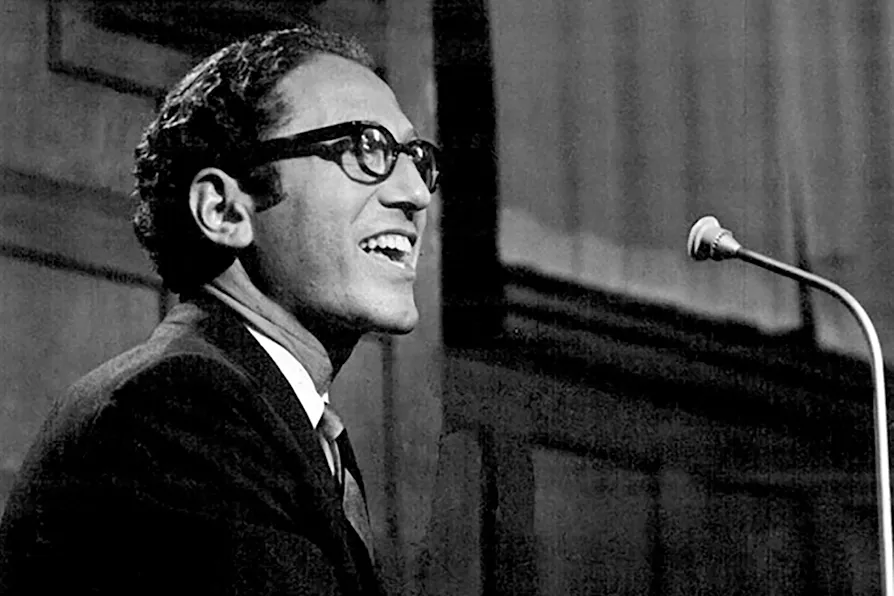John Wojcik pays tribute to a black US activist who spent six decades at the forefront of struggles for voting rights, economic justice and peace – reshaping US politics and inspiring movements worldwide
April 9 1928 – July 26 2025

 KNOCKABOUT SONGS: Tom Lehrer performing in Copenhagen, 1967. Pic: Public domain
KNOCKABOUT SONGS: Tom Lehrer performing in Copenhagen, 1967. Pic: Public domain
ON first hearing Tom Lehrer’s satirical songs in the 1970s I did not immediately think they, like those of Dylan, Cohen and The Beatles, would become part of the soundtrack of my life. Lehrer, who died aged 97 this week, seems an unlikely candidate for such loyal, long-term devotion.
Born to a New York family, he was a classically trained pianist and a lecturer in mathematics at Harvard. Most of his songs were written in the 1950s and ’60s, and he never sought “showbiz” fame or approval, asking why perform when he could be teaching mathematics?
Lehrer self-produced his first album in 1953, ostensibly for a Boston student audience, but it became a cult hit. A few albums followed but, despite his return to academia, his songs stubbornly refused to be forgotten, discovered by subsequent generations, some of whom could not quite believe such material could have been written in the staid post-war United States.
Satire can quickly become outworn and anachronistic but can also achieve enduring appeal — not only when its subject matter remains relevant and urgent but when delivered by a true master of the form, which Lehrer undoubtedly was.
Lehrer’s songs were written mainly during the McCarthyite period, itself a political act, challenging Establishment hypocrisy from militarism to racism, but also human folly in its multiple forms: repression, consumerism, recreational hunting and other general stupidities.
Although his humour and presentation were described as dark and at times brutal, it was never misdirected and in hitting its targets evinced the true satirist’s moral contempt for the oppressor, not the oppressed.
He used both the rapier and the bludgeon to equal effect, seldom if ever failing to puncture or bash his targets. His aim was true.
Although himself from the middle classes, even his knockabout songs carried a sting, expressing an anarchic Joycean contempt for authority in all its guises. The targets of his songs were many and various, but always the powerful, not those who could not answer back. Sung with deadpan detachment and self-accompanied on piano, which he could perfectly adapt to whatever genre he was parodying, he pointed out that irreverence is easy, but wit is hard.
And what wit! Every song begs to be memorised, with some lines simply unforgettable.
“I want to go back to the South land/ That you-all-shut-your-mouth land” (I Want to Go Back to Dixie); “Don’t say he’s hypocritical, Say rather he’s apolitical (Werner von Braun); “Once the rockets go up/ Who cares where they come down?/ That’s not my department/ Says Werner von Braun.”
He parodied folk music in his Irish Ballad and humorously observed that he admired folk singers who sing about things “everyone else is against, like peace, justice and brotherhood,” yet wrote one of the most memorable anti-war songs, We’ll All Go Together When We Go (“All infused with an incandescent glow/ Universal bereavement/ An inspiring achievement”). And the classic Poisoning Pigeons in the Park is hardly a traditional folk or poetic paean to springtime, but once heard, is never to be forgotten.
He was credited with saying that satire was dead when Kissinger won the Nobel Peace Prize, and in interviews seemed genuinely horrified at how violence and militarism persisted, implying nothing he could write would adequately address such horror.
He also satirised Harvard and academia generally, warning the privileged students he was so familiar with: “Soon we’ll be out amid the cold world’s strife/ Soon we’ll be sliding down the razor blade of life.”
Some of his songs were simply laugh-out-loud funny, the counterpoint between the parodic, often sprightly accompaniment, the dark material and lacerating lyrics reveals an artist of tremendous intelligence; yet instantly accessible. If his songs don’t hit you first time, you’re just not paying attention.
He greatly admired the operas of Gilbert and Sullivan, basing The Elements, which recites the periodic table in no particular order, on The Major General Song from The Pirates of Penzance — a song and performance that must be heard to be believed.
Lehrer said he went from adolescence to senility, by-passing maturity. Tongue in cheek that may be, but let’s be glad he did.
Fifty years after first hearing him, I’m still laughing at Lehrer’s songs. Harsh as his lyrics may seem to some, their wit and inventiveness may leaven their impact, but you are never in doubt whose side he is on.

SUSAN DARLINGTON swoons in the presence of a magnetic frontman

WILL STONE is impressed by a tour de force rendition of three decades’ worth of orchestral chamber pop

TOM STONE checks the political coordinates of a festival where the pleasures of nostalgia were (sometimes) harnessed to a new message

New releases from Steve Tilston, FolkLaw, and Patch and the Giant









